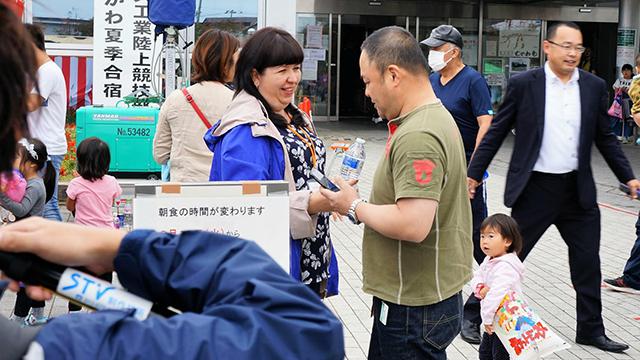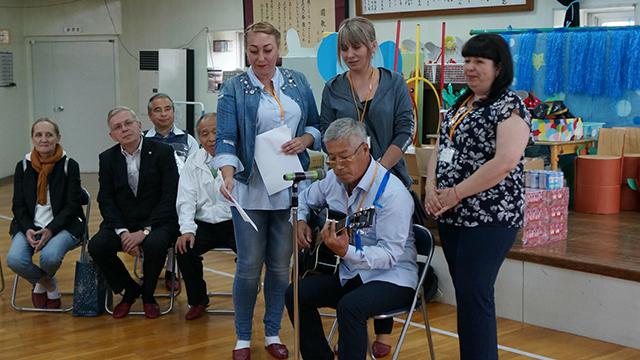A quickly-arranged visit
The location of visa-free visits is normally pre-determined and difficult to change, but the five Russians were eager to help people affected by the earthquake. Andrey Daneliya, a teacher, had approached a Russian organizer of the program to arrange the visit to Mukawa.
Daneliya told me that as a neighbor he couldn't stand by and do nothing. He said he had been to Hokkaido several times and seen many Japanese from Hokkaido visiting Shikotan. He said he could imagine their distress and wanted to help and cheer them up.
Daneliya said everyone in their group felt the same and that officials in both countries and Japanese supporters of the program worked hard to quickly arrange the trip.

A shared experience
The five Russians were no strangers to earthquakes. A temblor and tsunami off the east coast of Hokkaido 24 years ago devastated Shikotan Island. They remembered receiving food, water, fuel and other relief supplies from the people of Hokkaido.
Russian relief arrived much later due to commercial disruptions following the 1991 demise of the Soviet Union. People on the island began to view Hokkaido as more dependable than Moscow, triggering a temporary rise in public sentiment for returning the island to Japan.
Daneliya said they all had vivid memories of the help they received from Japan after the 1994 quake. He said it was their turn to lend a helping hand.

Children's greetings
The group visited a nursery school and presented the children with a picture of a rainbow-colored "bridge of friendship" drawn by children in Shikotan, connecting their island with Hokkaido.

They handed out traditional Matryoshka dolls and sang "Katyusha" and other popular Russian songs played on guitar. They sang, "May the sun always shine on you," and the children sang in return, "Clap your hands if you're happy."
Speaking on behalf of the group, Andrey Daneliya said they wanted to help and that they hoped everyone could get back to a normal life soon.
The nursery school head, Takashi Chisaka, said they appreciated the encouragement and heartfelt support. He said the feelings of the children in Shikotan were clearly communicated in their pictures, and that he hoped for more exchanges in the future.
The next stop was an evacuation facility in Mukawa where the group handed out bottles of Russian mineral water and inspected houses damaged by the quake. Daneliya said he wasn't sure if people there would like the Russian mineral water, but he was impressed by how politely they thanked him. He said he felt happy to be able to offer even a small amount of help to the evacuees.

Awareness of being neighbors
I started my career as an NHK reporter in 2004. I was first assigned to the bureau in Kushiro, in eastern Hokkaido, literally the frontline in covering the Northern Territories issue.
The former Soviet Union and Russia have long been of great interest to me. I lived in Moscow when I was a child and later studied in Uzbekistan after the Soviet collapse, so I delved into the issue of the Northern Territories.
Reporting on Japan-Russia relations on this issue I particularly noticed that the Russians visiting Mukawa regarded people in Hokkaido as their neighbors, and sought to repay their kindness.
Some have questioned the value of the visa-free exchange program, saying these mutual visits have become choreographed and routine. But this time there was something new. The five Russian visitors regarded people in the quake-hit area of Hokkaido as neighbors and wanted to help them.
Their offer of help was not only inspired by the swift assistance they got from Hokkaido during the 1994 quake. I think the visa-free program was also a factor. All considered, I think we can say that the program has begun to bear fruit.

Positive impact on Japan-Russia relations
The governments of Japan and Russia are planning joint economic activities on the Russian-controlled islands in a "new approach" to relations proposed by Japan. The aim is to lay the groundwork for signing a peace treaty that would fully normalize relations after World War Two.
Debate on the issue of the Northern Territories gained momentum when Russian President Vladimir Putin urged Japan to sign a treaty without preconditions by the end of this year. He made this proposal on September 12th at the Eastern Economic Forum in Vladivostok.
Daneliya seemed interested to hear that news. He said he thought relations would be smoother if a framework was in place to handle local residents concerns quickly. He also said he hopes the residents of both the territories and Hokkaido are heard in planning joint economic activities.
I'm hopeful that more developments like this visit will help build a new phase in relations between Japan and Russia on the issue of the Northern Territories.

